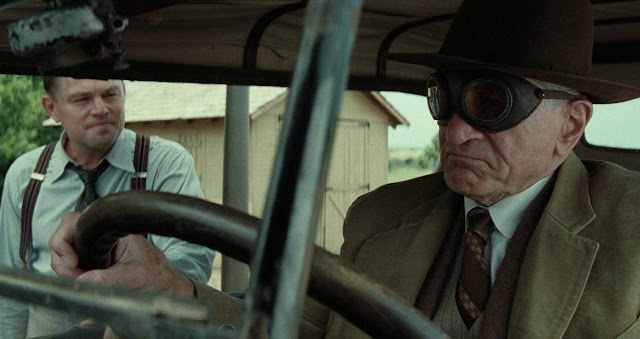"Our blood is getting whiter."

Apple Original Films / Paramount Pictures
Starring a deeply committed Leonardo DiCaprio and wondrous Lily Gladstone of Blackfeet and Nimíipuu heritage as a charming but greedy war veteran and his full-blooded Osage wife, the brutal and violent murders laid out are hardly mysterious but still unfold masterfully and are told with full and total suspense. While DiCaprio does fine dramatic work in line with his previous roles portraying no-good but otherwise harmless seeming scoundrels, it's Gladstone's soulful yet tortured performance as a strong Osage woman surrounded by anguish and tragedy that grounds the horrors of the film's real-life material.
Regular Scorsese collaborator Robert De Niro gives one of his finest and most quietly dastardly performances in years as the Oklahoman political boss Willian King Hale who controlled the wealthy Indigenous tribe and the political elite. The film revolves around him as a key figure where the seedy underground Oklahoman criminal element, killings, and industry intersect. He and DiCaprio together combine for a perfect dual manifestation of white supremacy.
Adapted by veteran screenwriter Eric Roth and Scorsese himself, the expansive script leaves plenty of room to develop and interrogate the Indigenous characters, their outrage, and defiance. They are hardly bystanders to these gruesomely targeted killings yet acknowledge the institutional corruption in front of them. Furthermore, the film addresses our complicity in the context of history as true-crime culminates in a pitch-perfect ending coda to confront our perception of the genocide of the Osage people while mirroring white America's greater culpability.
How Scorsese dramatizes the breadth and detail of the Osage County murders and the plot against the Native American wealth (the richest people per capita at the time) as an intimate yet sprawling crime saga of a Western makes for a deeply fascinating and stirring portrait of moral rot told through a psychological lens. Killers of the Flower Moon is the eighty-year-old filmmaker's longest and most expensive picture and shows his continued commitment to telling great American stories honestly through inherited culture and generational violence.
More | YVArcade / Indiewire / Inverse / Vox







0 reactions:
Post a Comment